- Top
- Sustainability
- Response Based on the Taskforce on Climate-related Financial Disclosures (TCFD)
- Superstore Operations Strategy (Scenario Analysis)
Superstore Operations Strategy (Scenario Analysis)
Operating Companies: Ito-Yokado, York-Benimaru
*Our superstore operations were reorganized in September 2023, with York merging into Ito-Yokado.
In the fiscal year ended February 28, 2023, we conducted a scenario analysis for the Seven & i Group’s three superstore operations of Ito-Yokado, York-Benimaru, and York. For this analysis, an organizational framework for the scenario analysis was created within each of the three superstore companies, with management and the major departments relating to climate change taking part, toward the aim of formulating substantial countermeasures and accurately quantifying business impacts. By discussing the risks, opportunities, and countermeasures at each department we have facilitated analyses aligned to actual situations, thereby improving our capacity to respond to climate change.
Scenario Analysis Assumptions
Analysis assumptions (fiscal year ended February 28, 2023)
| Scenario | Decarbonization scenario (1.5°C–2.0°C) / Warming scenario(2.7°C–4.0°C) |
| Relevant project | Operation of Ito-Yokado, York-Benimaru, and York stores in Japan |
| Analysis scope | In addition to the physical impact on stores, the analysis will cover costs in store operations and merchandise supply chain issues (raw materials, factories manufacturing merchandise, merchandise shipping) that significantly affect store operations, and customer behavior |
| Target year | Impact as of 2030 |
In this scenario analysis, mindful that the 1.5°C target has become the mainstream worldwide, we implemented analyses consistent with this 1.5°C target. Specifically, we set two scenarios, a “decarbonization scenario (1.5°C–2.0°C)” and a “warming scenario (2.7°C–4.0°C),” with reference to reports on future forecasts and other materials issued by governments and international organizations, including STEPS,*1 APS,*2 and NZE2050,*3 indicated in the World Energy Outlook of the International Energy Agency (IEA). We analyzed the impact of climate change as of 2030.
-
- *1 STEPS: Stated Policies Scenario. This scenario reflects decarbonization policies and targets that have been so far publicized.
- *2 APS: Announced Pledges Scenario. This scenario assumes that all climate-related commitments made by governments announcing long-term targets of net zero emissions are fulfilled in full and on time.
- *3 NZE2050:Net Zero Emissions by 2050. Surpassing the Paris Agreement target, this scenario aims for net zero CO2 emissions before 2050 toward achievement of the 1.5°C goal.
Significant Risks and Opportunities, and Countermeasures
Many of the respective risks and opportunities were identified as a result of discussions within each department of three superstore companies regarding specific risks and opportunities that could affect the superstore operations. The assessment referenced each risk and opportunity presented with reference to the case studies and various reports analyzing the domestic convenience store business in the fiscal year ended February 28, 2022. We examined the magnitude of the impact of these risks and opportunities on financial aspects such as sales and profits, as well as strategic aspects such as store operations and merchandise procurement. With carbon emissions targets and policies in each country, changes in consumer preferences, increases in the severity and incidence of extreme weather events, and changes in precipitation and weather patterns as the items for significant risks and opportunities, we qualitatively and quantitatively evaluated the various impacts on the business of these factors and formulated countermeasures for each.
Listing of three superstore companies' risks and opportunities, and countermeasures
◆Transition risks and opportunities (Decarbonization scenario, 1.5°C–2.0°C)
|
Significant risks and opportunities |
Concrete examples | Impact | Scenario | Business risks | Business opportunities | Main countermeasures | |
|---|---|---|---|---|---|---|---|
|
Policies and regulation |
Carbon emissions targets and policies in each country | Introduction of carbon pricing | Operating cost |
|
〇 |
|
|
|
〇 |
|
|||||
| Fluctuations in retail electricity prices | Operating cost |
|
〇 |
|
|||
| Expanded use of EVs | Operating cost |
|
〇 |
|
|||
| Sales |
|
〇 | |||||
| Reputation | Changes in consumer preferences | Changes in sales due to sales of sustainable merchandise | Sales |
|
〇 |
|
|
◆Physical risks and opportunities (Warming scenario, 2.7°C–4.0°C)
|
Significant risks and opportunities |
Concrete examples | Impact | Scenario | Business risks | Business opportunities | Main countermeasures | |
|---|---|---|---|---|---|---|---|
| Acute | Increases in severity, frequency, etc. of extreme weather events | Damage from natural disasters | Operating cost |
|
〇 |
|
|
| Increased trust and sales through improved resilience | Sales |
|
〇 |
|
|||
| Insurance cost related to natural disasters | Operating cost |
|
〇 |
|
|||
| Chronic | Changes in precipitation and weather patterns | Price fluctuations of raw materials for agricultural, livestock, and marine products | Operating cost |
|
〇 |
|
|
| Increased average temperatures | Operating cost |
|
〇 |
|
|||
| Sales |
|
〇 |
|
||||
|
〇 | ||||||
| Creation of new sales opportunities and expansion of sales opportunities |
Sales |
|
〇 |
|
|||
*The scenario with the larger impact was referred to in assessing each business impact.
* Some items are limited according to location and store size.
(1)Significant transition risks and countermeasures: Decarbonization scenario (1.5°C–2.0°C)
We considered the transition risks and opportunities based on the decarbonization scenario in which various regulations and other measures are introduced to achieve the 1.5°C target. Of these, we estimated the following regarding the impact of the carbon tax system due to the introduction of carbon pricing, which is projected to have the biggest impact.
Significant transition risk: Impact of the carbon tax system
| Item | Business impact |
| Carbon tax (2030) | ¥7.4 billion |
Assumption: Carbon tax: $135/ton-CO2 (Maximum amount given in the IEA’s World Energy Outlook 2022)
・Foreign exchange rate: \131.62/$ (Rate used in financial statements for the term ended February 2023)
For our estimate, with reference to the IEA’s World Energy Outlook 2022, we calculated the impact of carbon tax at the maximum amount of $135/ton-CO2 as of 2030. The total of three superstore companies' carbon taxes was estimated at ¥10.7 billion based on a simple calculation, assuming CO2 emissions increase in line with the growth of business activities. However, if we reduce CO2 emissions to 50% in 2030 (compared to FY2013 levels) as per the target defined in our “GREEN CHALLENGE 2050” environmental declaration, this will reduce carbon taxes by ¥3.3 billion to ¥7.4 billion. Furthermore, we expect that the impact of the carbon tax will eventually be eliminated by promoting efforts to achieve our 2050 net zero emission target.
◆Main countermeasures
We will significantly reduce our carbon tax burden and transition risks such as higher electricity fee payments through efforts to achieve reductions in CO2 emissions. As approximately 90% of the Group’s CO2 emissions are attributable to electricity use from store operations, the three initiatives of energy savings, energy generation, and procurement of renewable energy are being pursued to reduce emissions. We also aim to reduce emissions throughout the supply chain, including Scope 3 emissions.
Superstore Operations are focusing the following main activities.
1 Energy savings
Reduction of electricity use through installation of energy-saving equipment as well as employees’ efforts to save energy (reviews of in-store lighting levels, temperature levels of refrigerators and freezers, and replacement with LED lighting)
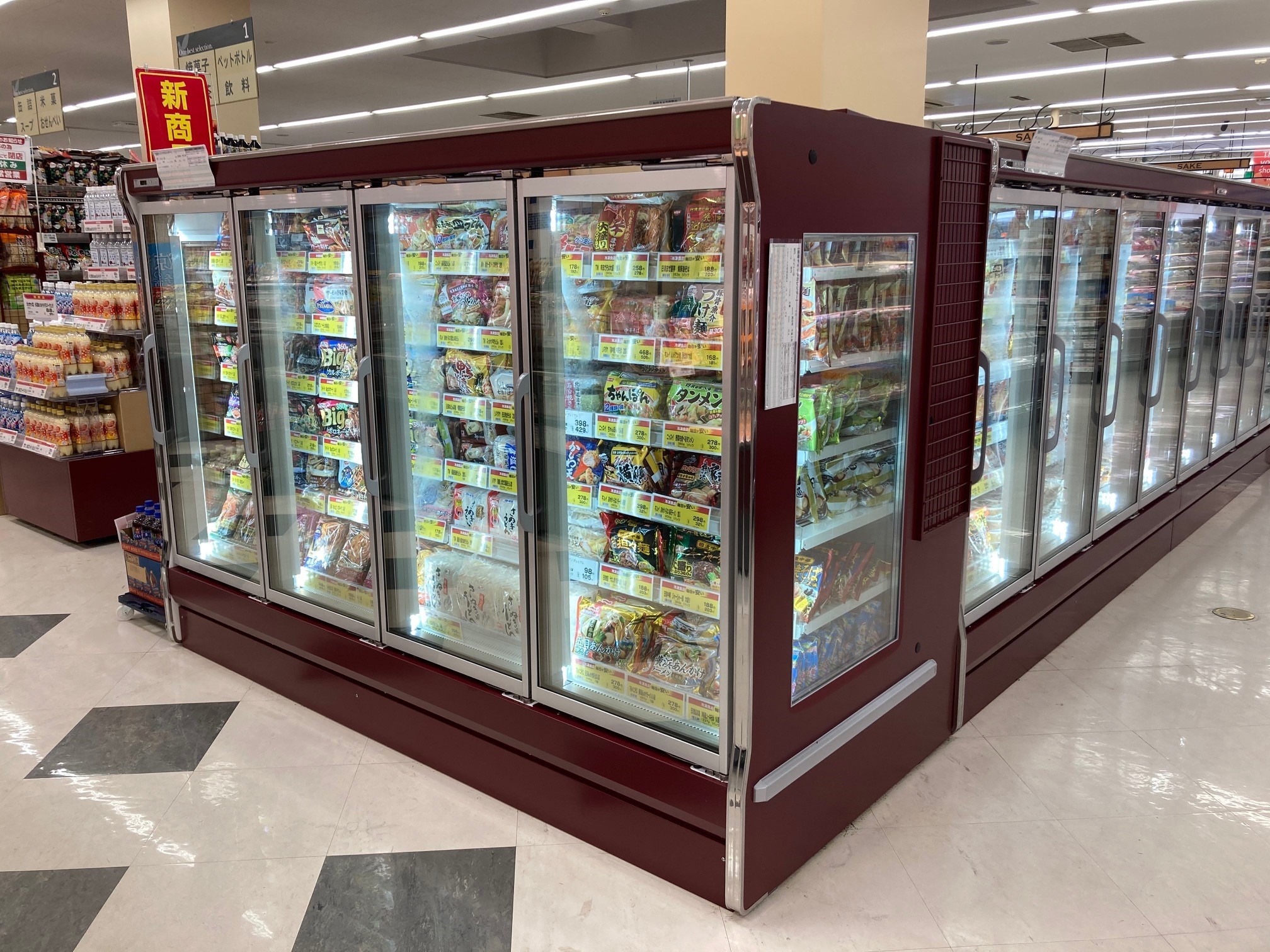
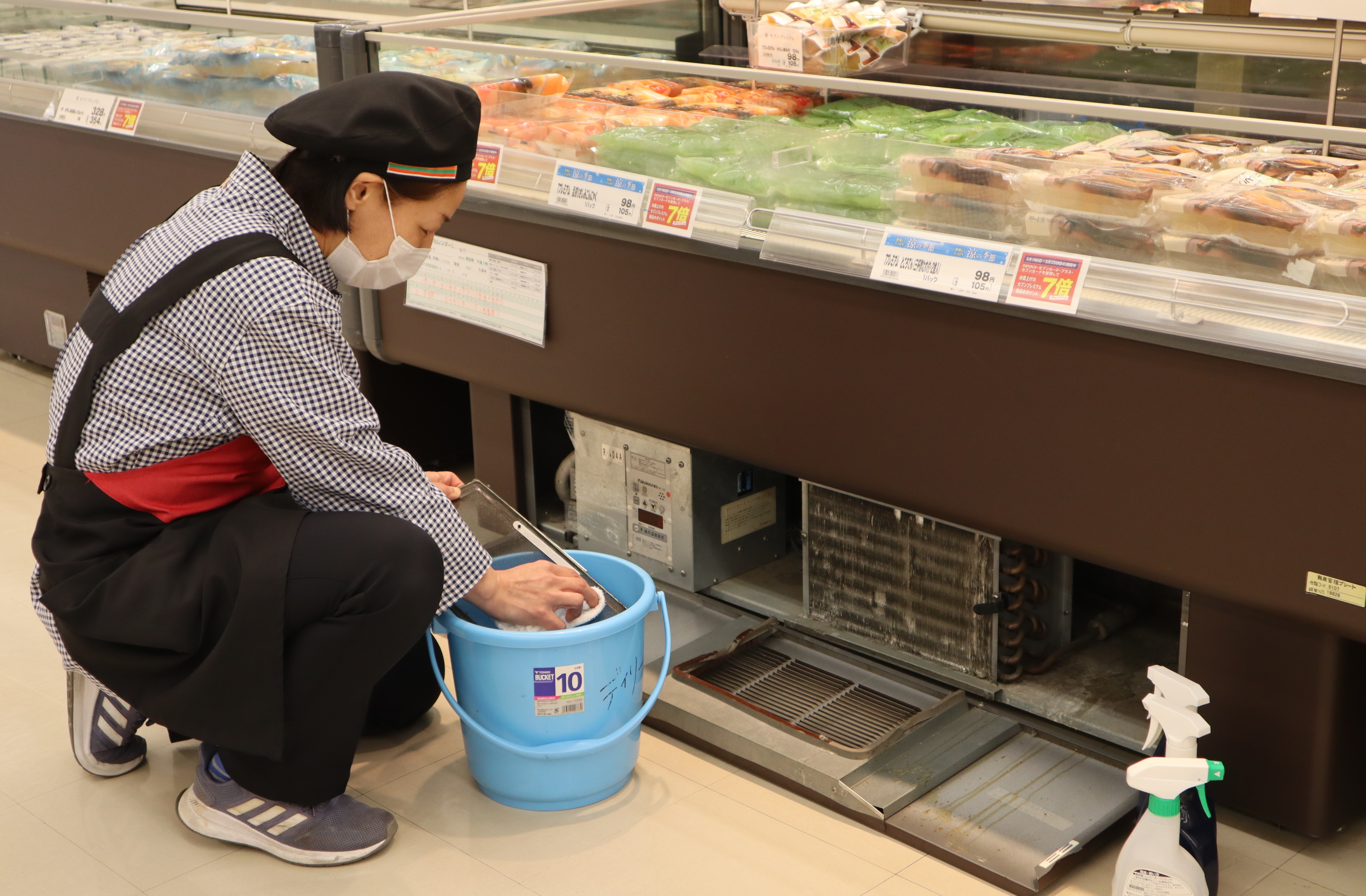
Reach-in cases that keep cold air in (York Mart) Cleaning the filters on a refrigerator case (York Mart)
2 Energy generation
Solar panels have been installed at 23 Ito-Yokado stores (including 9 York stores) and 42 York-Benimaru stores (as of the end of February 2023).
3 Procurement of renewable energy
We are expanding cooperation with various electric power companies, including an offsite power purchase agreement (PPA).
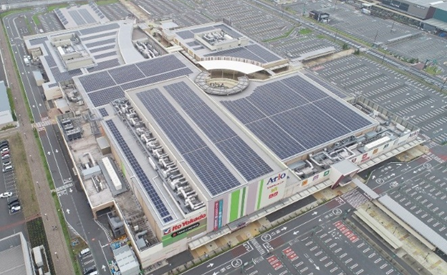
Ario Ichihara store
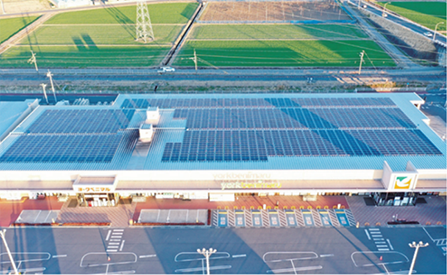
York-Benimaru Ohiramachi store
News releases related to countermeasures, etc.
・2023.2 Signing of “agreement on promoting carbon neutrality and cooperation in the event of a large-scale power outage due to a natural disaster” using York-Benimaru stores in Nasushiobara City, Tochigi Prefecture (in Japanese)
(2)Significant physical risks and countermeasures: Warming scenario (2.7°C–4.0°C)
Significant physical risks: Impacts of natural disasters
| Item | Business impact |
| Store damage, merchandise damage, loss of sales due to closures, restoration cost, etc. | ¥5.5 billion |
Assumption: A disaster of similar scale to 2019 (Typhoon No. 19)
* Estimates are based on actual damage from the 2019 disaster and forecasts of an increased frequency of disasters and floods. To ascertain the extent of damage, estimates were made without considering insurance coverage.
In the warming scenario, natural disasters caused by extreme weather pose the greatest risk. It is difficult to predict when and where natural disasters will occur, and once they do, they can cause extensive damage. Currently, the occurrence of extreme weather such as heavy rainfall that cause disasters are increasing due to global warming, and this trend would become even more pronounced under this scenario.
Based on the extent of damage caused by past disasters, and assuming “a disaster of comparable scale to that experienced in the fiscal year ended February 29, 2020, when a planned closure was implemented due to Typhoon No. 19 (Typhoon Hagibis),” which can be expected to result in both serious and widespread damage, the total amount of damage, including store damage, merchandise damage, loss of sales due to closures, and restoration costs, is estimated at a total of \5.5 billion for the three superstore companies. It should also be noted that while the probability of disasters and flooding is lower than in this scenario, natural disasters precipitated by extreme weather events are also considered to be a particularly significant risk in the decarbonization scenario, with the total extent of damage estimated at \4.6 billion and the impact being assessed.
◆Main countermeasures to impacts of natural disasters
We will strive to quickly reopen its stores and establishments in the event of a natural disaster as part of enhanced disaster response to continue serving as regional relief bases for local customers offering infrastructure, evacuation locations, etc. The following measures are being taken to address the increasing risk of natural disasters.
・Establish early recovery systems
・Create stores that anticipates flooding (expanding the installation of watertight panels and tide barrier)
・Continue operations in the event of a disaster with “Phase Free (a concept of securing an adequate quality of life, regardless of phases such as daily life and emergencies)” facilities, including improved performance of storage batteries
・Prepare fuel reserves for emergency supply delivery
・Develop disaster bases utilizing store infrastructure through disaster management agreements, etc.
Number of comprehensive alliance agreements with local governments (by operating company)
| As of the end of February 28, 2021 | As of the end of February 28, 2022 | As of the end of February 28, 2023 | |
| Ito-Yokado | 56 | 79 | 78 |
| York-Benimaru | 10 | 11 | 14 |
| York Mart | 4 | 4 | 4 |
| Total | 267 | 320 | 329 |
(Alliances with local governments) Initiatives of Ito-Yokado
・July 13, 2022 Supplies provision drill, Funabashi City, Chiba Prefecture
・September 3, 2022 Joint comprehensive disaster drill, Shinagawa-ku and Tokyo Metropolis
・November 5, 2022 Exhibition at disaster prevention fair, Asaka City, Saitama Prefecture
・November 4, 2022 Conclusion of agreement on the supplies provision in the event of a major disaster* with Akabane Fire Station, Tokyo Fire Department
・December 1, 2022 Conclusion of agreement on facilities use in the event of flooding with Ageo City, Saitama Prefecture
・February 14, 2023 Conclusion of an agreement on supplies provision in the event of a major disaster* with Tama Fire Station, Tokyo Fire Department
*Agreement relates to the supply of foodstuffs, daily necessities, and other essentials to firefighters engaged in rescue and relief operations in disaster-affected areas in the event of a major disaster.
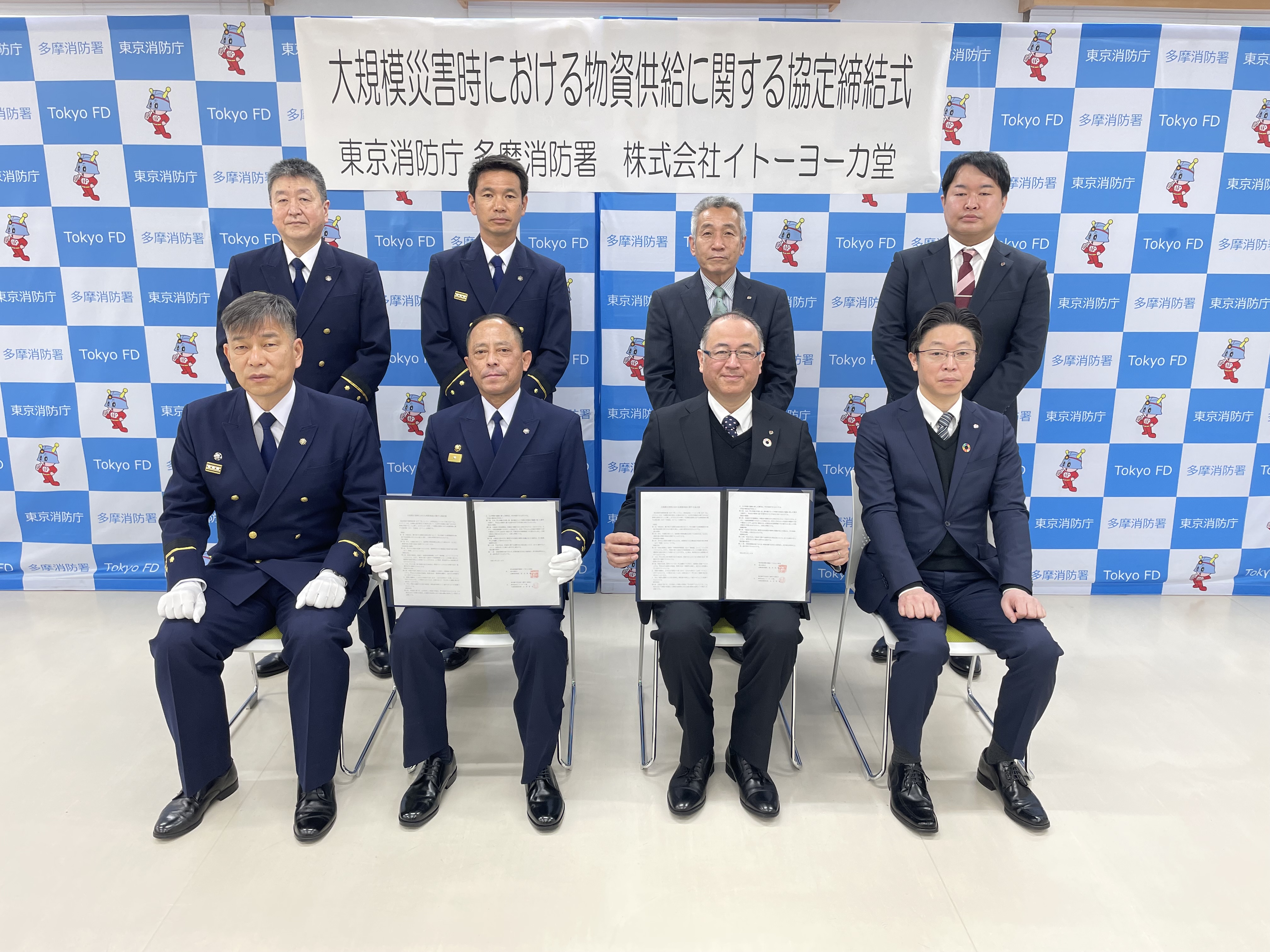
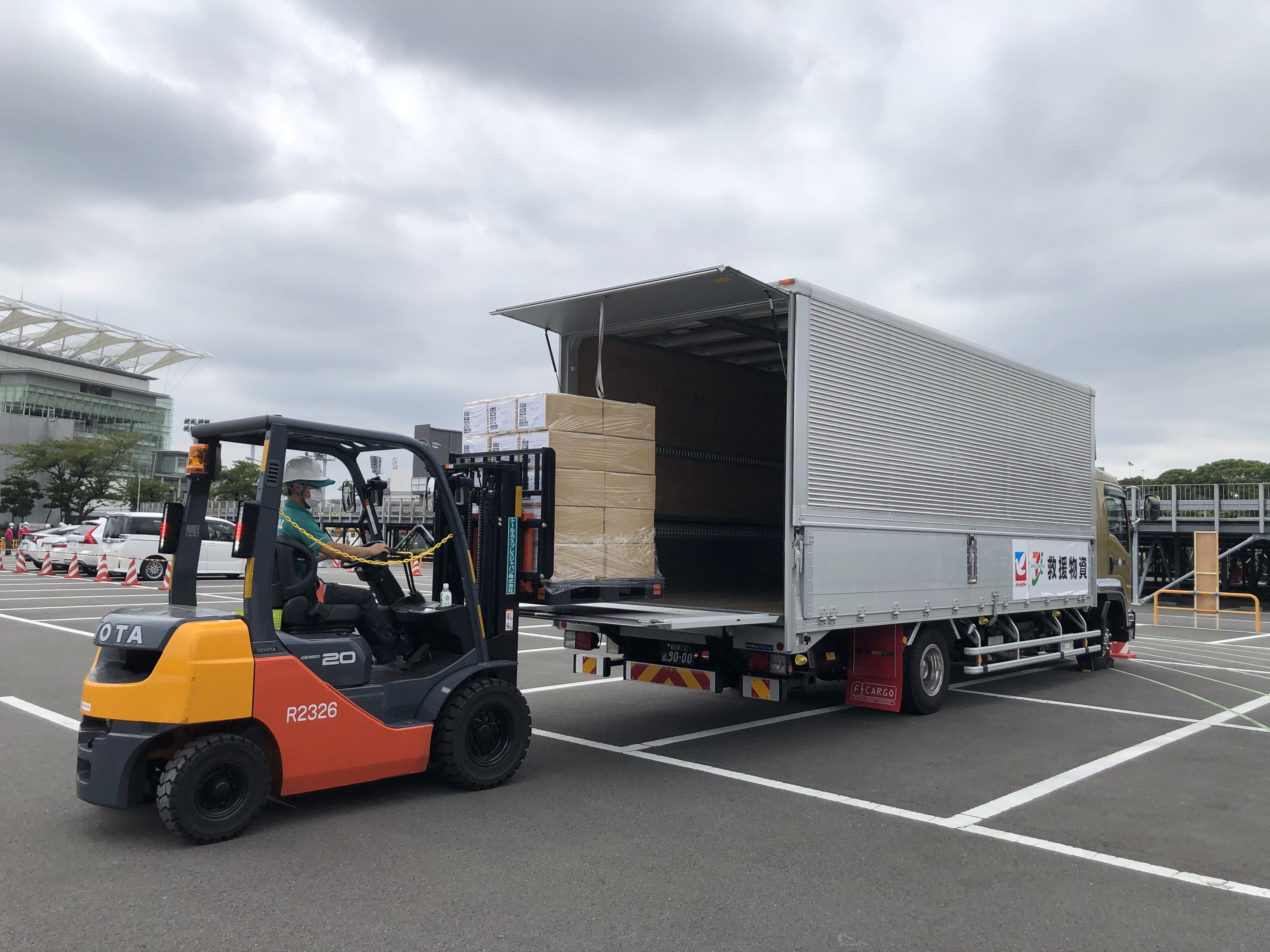
Agreement signing ceremony with Tama Fire Station, Tokyo Fire Department Joint comprehensive disaster drill, Shinagawa-ku and Tokyo Metropolis
(Alliances with local governments) Initiatives of York-Benimaru
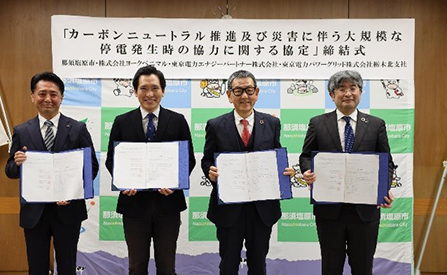
Related website link
・We shall not forget: 10 years after the Great East Japan Earthquake (in Japanese)
Significant physical risks: Increase in raw material cost
The increase in raw material cost due to changes in weather patterns, which is expected to have the next largest impact, was estimated. Based on the composition of purchase amounts and the availability or otherwise of future data, “rice, tomatoes, and pork” were selected as the raw materials to be subject to the first-year analysis in the superstore operations (with plans to extend the scope of analyses going forward).
The increase in the purchase amounts was estimated assuming that climate change impacts will result in reduced yields* and that the purchase amounts would increase accordingly. This clarified that the impacts for the procurement of “rice, tomatoes, and pork” can be expected to become pronounced mainly under the warming scenario. Furthermore, for raw material procurement, both the “change in weather patterns,” and the aforementioned “carbon tax system” as well as the “increase in natural disasters” can be expected to have contingent impacts, with various countermeasures being considered and implemented in light of this fact.
* Yield changes are estimated from data provided by the Ministry of Education, Culture, Sports, Science and Technology; the Ministry of the Environment; the Japan Meteorological Agency; the National Institute for Environmental Studies; the National Agriculture and Food Research Organization, etc.
◆Main countermeasures for Increase in raw material cost
Under our environmental declaration “GREEN CHALLENGE 2050,” we set sustainable procurement as a specific theme—ensuring that food ingredients used in our original products are guaranteed sustainable, and are working toward a society that is in harmony with nature. Below are representative initiatives which we are undertaking for stable procurement as countermeasures for Increase in raw material cost.
・Disperse and consolidate production sites of raw materials
・Ensure stable procurement through the expansion of raw material and certified raw material (marine and agricultural product) procurement from weather-resistant sources, such as vegetable factories, land-based aquaculture, etc.
・Utilize digital technology and AI
・Expand lineup of frozen and processed foods resistant to the influence of climate
Agricultural products
In addition to promoting the acquisition of GAP certification* in cooperation with producers at respective companies, we also sell private label vegetables such as “Fresh Foods with Traceability” (Ito-Yokado) and “Mitsuboshi Agricultural Products” (York-Benimaru), which deliver select, domestically-sourced vegetables grown with guaranteed safety, reliability, and deliciousness. These efforts are designed to disclose information about safe, environmentally sound products—who produces them, where, and with what motivations.
* Good Agricultural Practice (GAP) is a certification given to producers who engage in sustainability efforts in agriculture, awarded through third-party inspection.

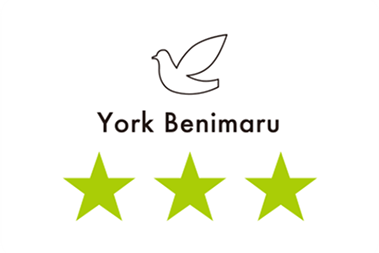
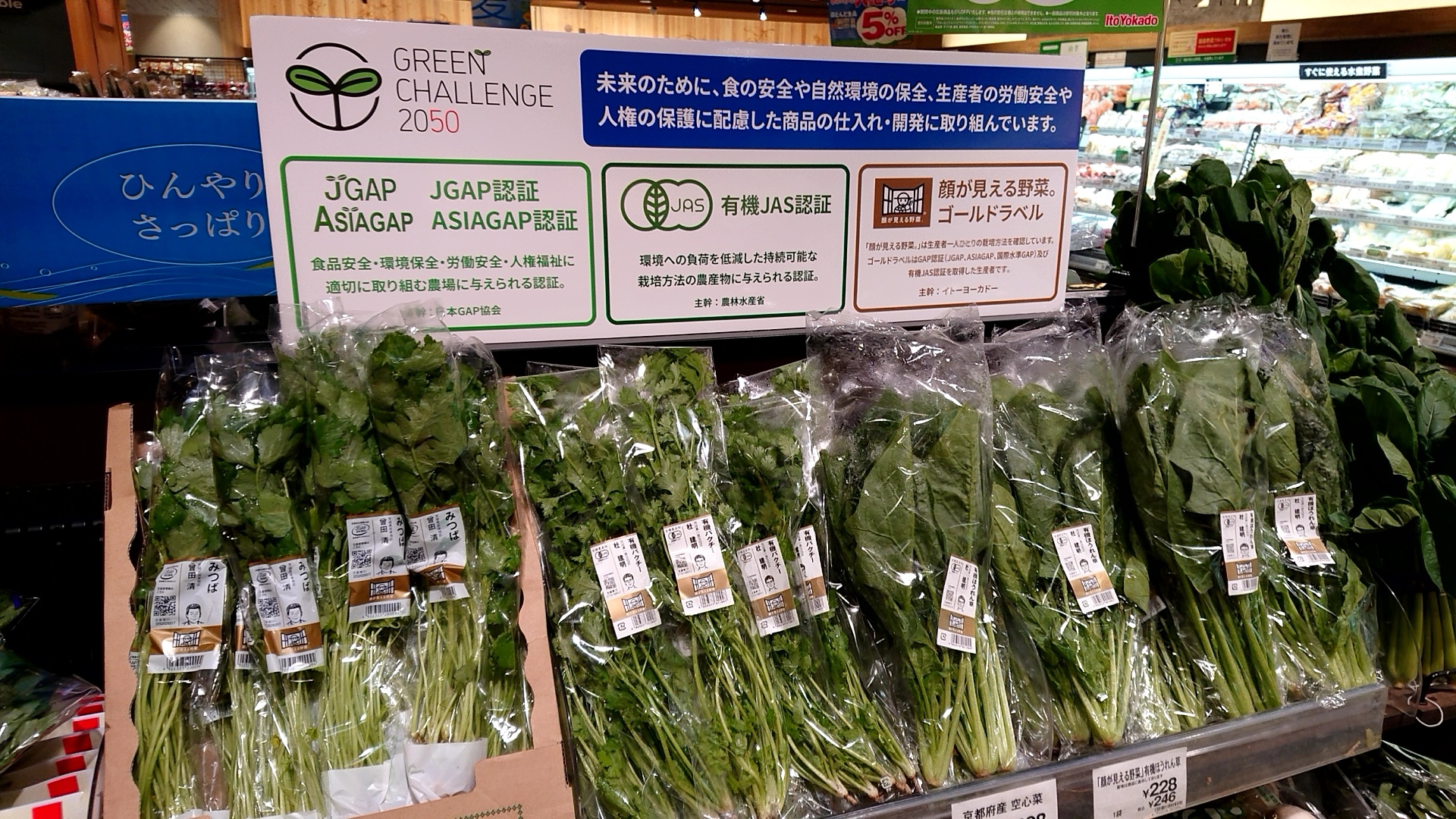
Vegetables sales floor (Ito-Yokado)
Number of employees in the Seven & i Group with JGAP instructor qualifications
| FY2021 | FY2022 | |
| No. of employees with JGAP instructor qualifications | 62 | 139 |
* Total for JGAP fruits and vegetables and livestock
* Employees of Seven-Eleven Japan, Ito-Yokado, York-Benimaru, Seven & i Food Systems, IY Foods, and Seven & i Holdings
Sales of Ito-Yokado’s “Fresh Foods with Traceability”
| FY2019 | FY2020 | FY2021 | FY2022 | |
| Amount of sales* (billion yen) | 228 | 246 | 243 | 248 |
* Approximate figures
Marine products
Seven & i Group is working to sell products for which sustainability is guaranteed, such as those certified by the MSC*1 and ASC,*2 to pass on the rich blessings of the sea to future generations.
In October 2022, the Group acquired Chain of Custody (CoC) certification—a standard for the distribution and management of certified nature and environmentally friendly marine products—from the international non-profit organizations the Marine Stewardship Council (MSC) and the Aquaculture Stewardship Council (ASC). The CoC certification system is used to attest that seafood that has been certified by MSC and ASC as having been produced with consideration to the natural environment has been properly managed without being mixed with non-certified seafood through all the processes of production, processing, and distribution. Obtaining the CoC certification has additionally enabled us to sell MSC and ASC certified seafood processed in-store at the Group’s supermarkets as certified products. Before this, seafood which had been certified by MSC and ASC s sold in Group supermarkets had been limited to a few products processed outside stores, such as fish roe. Under the current CoC certification, meanwhile, sashimi (raw fish) and sliced/filleted products processed in Group supermarkets, including Seven Premium Fresh, the mainstay of our seafood range, can now also be retailed as certified products.
Further, to fulfill our responsibility as a retail business that connects producers and customers, we are also focusing on conveying the value of these products and the producers’ desires to customers through our stores and websites.
*1 Marine Stewardship Council (MSC) certification is a standard for marine products of natural origin relating to sustainable fisheries properly managed with consideration to marine resources and the environment.
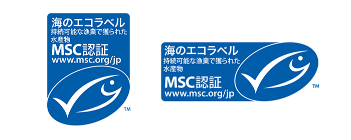
*2 Aquaculture Stewardship Council (ASC) certification is a standard for aquaculture products farmed under a responsible aquaculture industry model which takes into account both workers and local communities, in addition to endeavoring to prevent pollution of the natural environment and the overuse of resources.


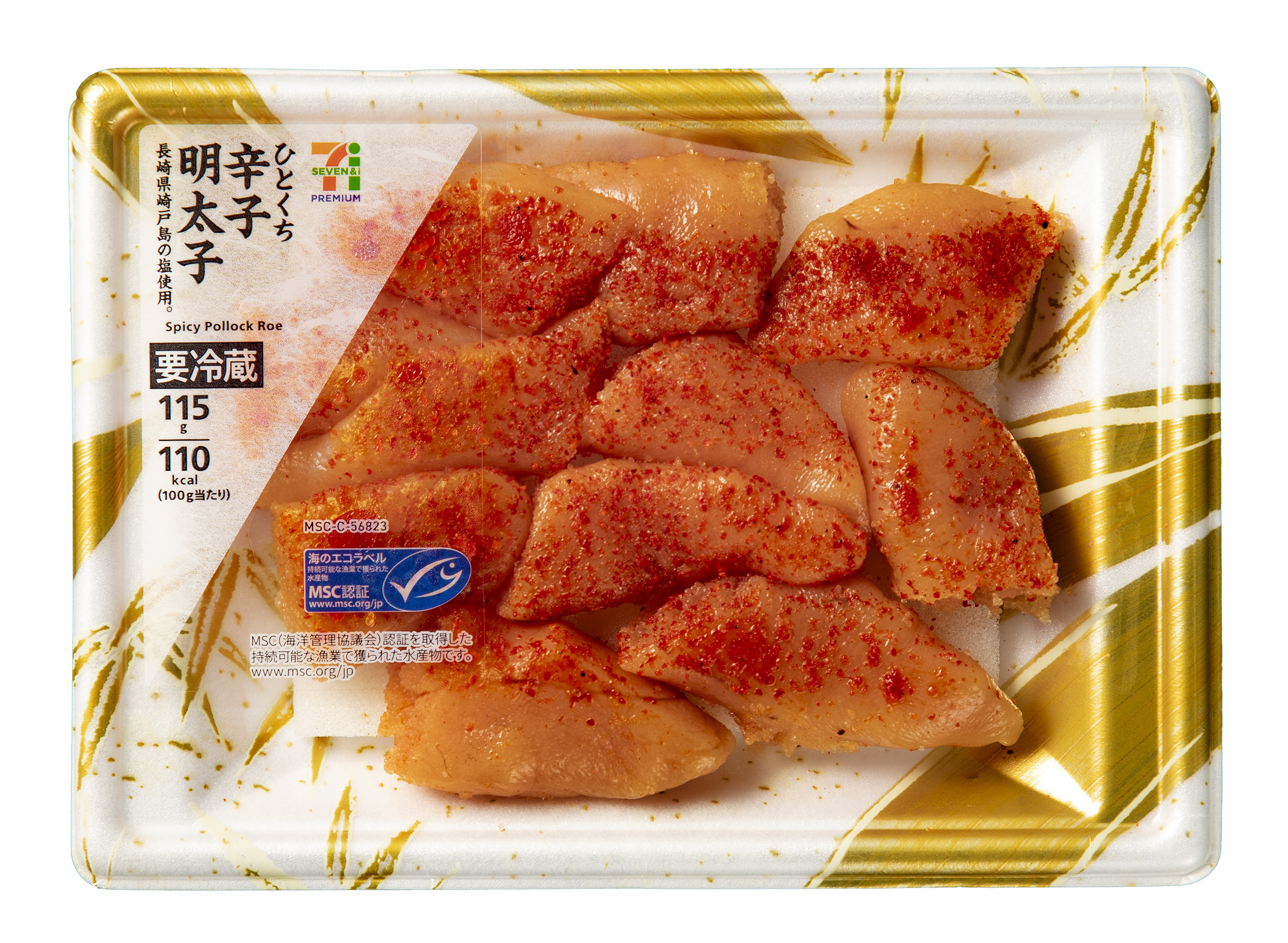
News releases related to countermeasures, etc.
・2022.10 Seven & i Holdings obtains MSC/ASC CoC certification and begins selling certified seafood processed in-store at 461 stores in its three superstore companies (in Japanese)
(3)Business opportunities and main countermeasures for both scenarios
Business opportunities for the decarbonization scenario
In this scenario, we see changes in consumer awareness as a business opportunity. As consumers develop a strong interest in sustainable products and services in line with government policy and trends toward carbon neutrality, we believe that our current efforts will lead to opportunities and further accelerate those efforts. The following initiatives being promoted under our environmental declaration “GREEN CHALLENGE 2050” are good examples.
◆Initiatives to reduce CO2 emissions
As electric vehicles become more common on the roads in the decarbonization scenario, we believe that offering EV charging services at a greater number of superstore parking lots will create more customer traffic. The two superstore companies have installed approximately 2,373 chargers for EVs as of the end of June 2023.
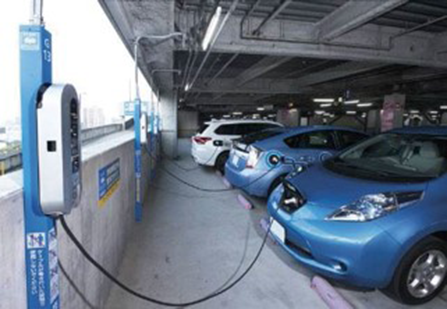
◆ Initiatives for measures against plastic
We believe that converting the containers and packaging used for our original products to environmentally friendly materials and promoting PET bottle collection and recycling will attract public attention and create more customer traffic.
Taking measures against plastic is one of the initiatives specified in our environmental declaration “GREEN CHALLENGE 2050.” We have set targets to convert the containers and packaging used for our original products (including Seven Premium) to 50% environmentally friendly materials by 2030 and 100% by 2050, thereby reducing the burden on the environment from waste plastic. At Ito-Yokado, York-Benimaru, and York, we have devised sales methods for fresh food and delicatessen items that reduce the amount of containers and packaging used, such as selling by weight or selling individual loose items. In our delicatessen items sales areas, we are increasingly using paper bags rather than plastic containers for selling items such as croquettes and deep-fried chicken. In some other stores, some products sold in fresh meat sales areas have adopted the method of packing meat for sale in plastic bags without a polystyrene tray.
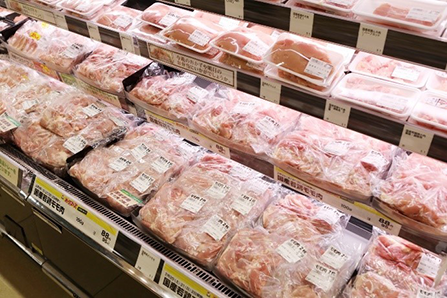
Related news releases, etc.
・2022.3 Measures against plastic at Ito-Yokado (in Japanese)
Collection machines of plastic PET bottles have been installed at 2,935 superstores and Seven-Eleven convenience stores as of July 21, 2023. The collected bottles are recycled into new PET bottles and underwear in Japan through a “closed-loop” recycling system.
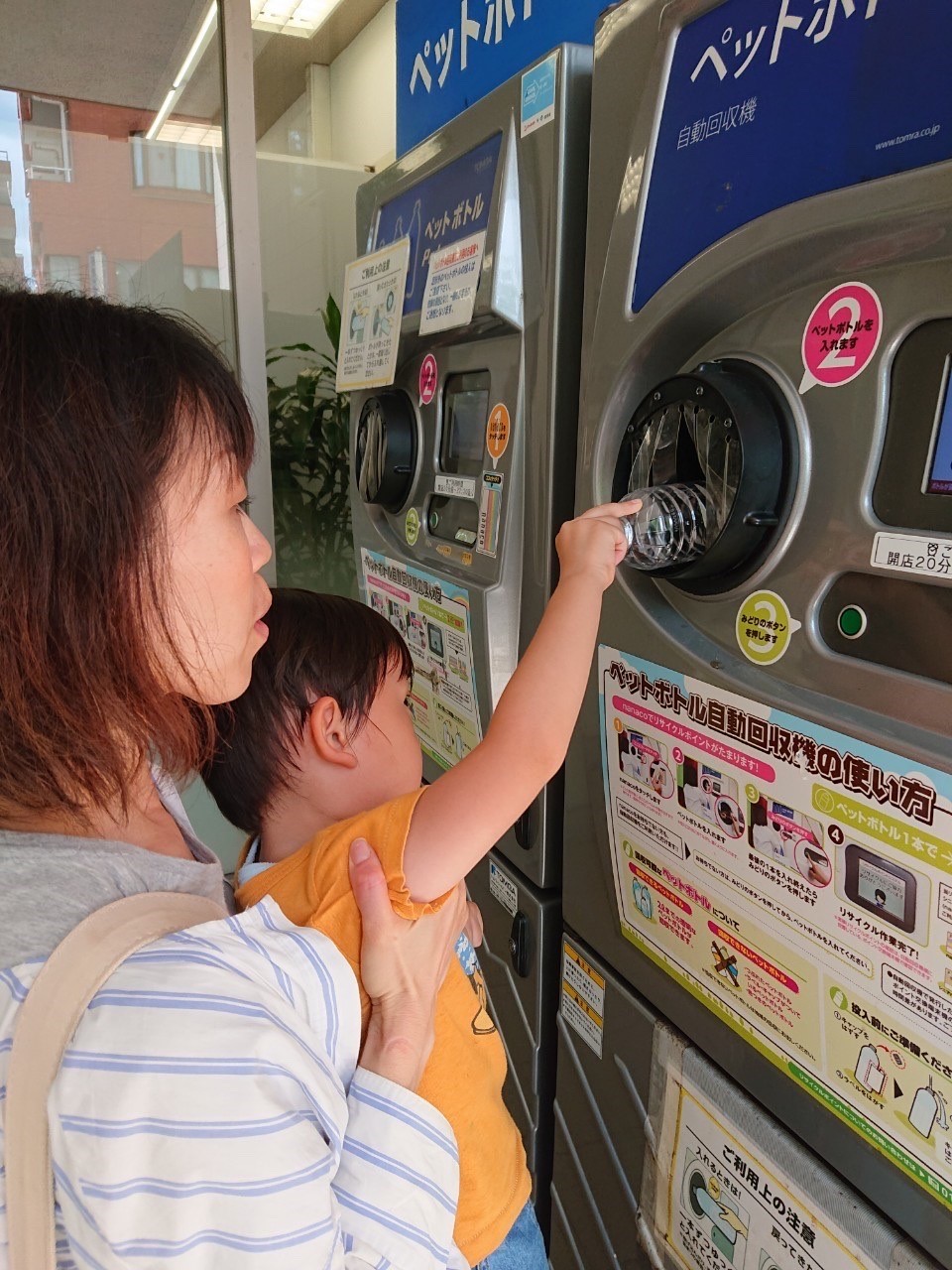
◆Initiatives for sustainable procurement
We are expanding our lineup of sustainable products that have acquired official certifications such as MSC, ASC, and MEL certifications for marine products and GAP certification for agricultural products, including private label vegetables such as Ito-Yokado’s “Fresh Foods with Traceability” and York-Benimaru’s “Mitsuboshi Agricultural Products,” which we hope will attract public attention and create more customer traffic.
Business opportunities for the warming scenario
In this scenario, we see changes in customer preferences and consumer behavior due to rising temperatures as business opportunities in the following ways.
・Consumers’ heightened awareness of disaster mitigation will increase demand for disaster preparedness products
・Increased sales of products that people wish to have in hot weather (cooling products)
・The frequency of outings will decrease caused in hot weather, so e-commerce services such as delivery business will flourish
◆Roll out of disaster preparedness aisles on sales floors
Disaster preparedness aisles are being rolled out at Ito-Yokado stores in line with the growing awareness among customers of the importance of disaster preparedness.
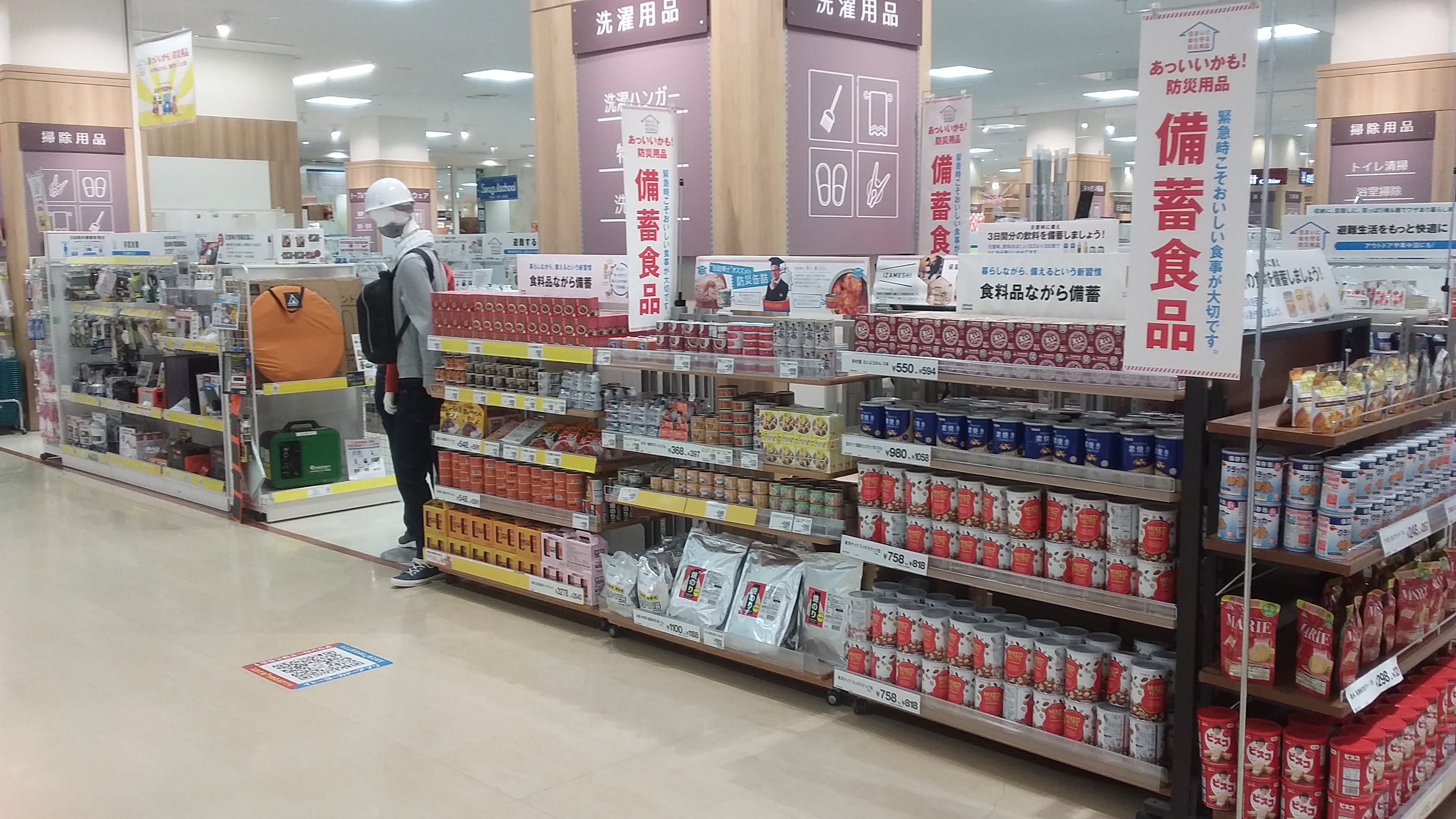

Refer here for more details of responses to climate change by superstores.
・Ito-Yokado website: CSR—Social and Environmental Initiatives (in Japanese)
・York-Benimaru website: CSR Report 2022 (in Japanese) *Refer to Material Issue 3
